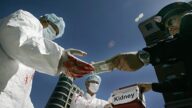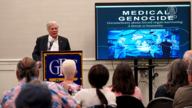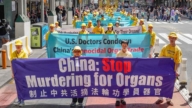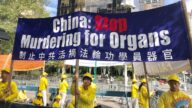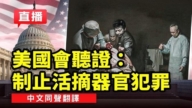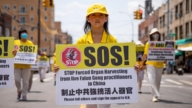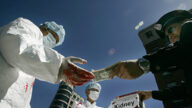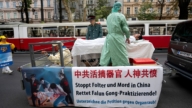【新唐人2012年11月26日訊】在美國眾議院外交委員會今年9月舉行的聽證會上,證人伊森‧古特曼揭露中共系統組織活摘人體器官的罪行,多家醫院在處決現場等候瓜分被處決人的器官,手法駭人聽聞。日前,深圳前刑警張建華在結束香港申冤的行程回到美國之前,接受了本臺記者專訪,揭露中共公安黑幕。而稍早之前,他證明,中國的監獄犯人在處決場上被活摘器官確實純在。
目前定居在美國的深圳前刑警張建華說,他96年親眼目睹在深圳的槍斃現場,就備有流動車輛,可即時進行活體器官摘除。
深圳前刑警張建華:「那天好像是判11個人,用了6輛麵包車,或者4輛或5輛的人貨車,槍斃現場一路都有保安,這6輛麵包車可能是手術車、做手術的,誰都知道這個屍體一定在車上做手術。」
張建華描述,當天被槍斃的一名受刑人叫陳龍展,他應陳龍展的弟弟要求,帶他去看他哥哥最後一眼。
張建華:「那個包(裝屍體的)有很多的血,那麼應該是說,槍斃了之後馬上放在袋子裡面動手術之類的,是在裡面動了手術切了器官,因為他看到裡面很多器官都是空的。」
伊森‧古特曼,是「保衛民主基金會」的研究員、和《失去新中國》一書的作者。他為了查明中國良心犯被大規模摘取器官的真相,從2006年開始,對中國的醫療人員、執法人員,和50多位來自勞教系統的國際難民,進行了廣泛採訪。
美國眾議院外交委員會今年9月12號,舉行「中共摘取宗教和政治異見人士器官」聽證會,會上伊森‧古特曼作為證人之一作證發言。
根據伊森‧古特曼的調查,中共摘取異見人士器官的罪行,是從上世紀80年代開始。到90年代初,變成了一種系統性的行為。伊森‧古特曼在聽證會上,引述了新疆烏魯木齊公安局第一區特警尼亞特‧阿布杜拉伊姆(Nijat Abdureyimu)的證詞說,從活人身上摘取器官現在已經成為了一種慣例,那些人常常是在手術過程中斷氣的。
《失去新中國》作者伊森‧古特曼:「我根據我的調查和研究,中共從良心犯身上摘取器官是上世紀90年代末在新疆開始的。到2001年,這種行為擴大到全中國,而法輪功學員提供了一個更大且常常匿名的潛在捐獻者庫。」
一位逃亡歐洲的中國內科醫生,19年前在廣州「中山醫學院」工作,他向伊森‧古特曼透露,1991年秋,他曾作為一個小型醫療隊的成員,隨車到廣州南郊的一個處決犯人的現場。在那裏,36名被處決的囚犯所對應的72個腎臟及角膜,被當地醫院瓜分。每輛麵包車裡都有手腳俐落的手術師,在15∼30分鐘內完成摘除工作。之後駛回醫院,在6小時之內進行移植。
伊森‧古特曼採訪過8位曾被關押在不同地方的法輪功學員,他們都經歷過非常相似的體檢。如大量抽血、X光胸部透視、做尿檢、腹部檢查、以及詳細的眼角膜檢查。
伊森‧古特曼:「我強烈抗議中共政府為這類檢查提供的那些所謂醫學解釋。否則為甚麼要對這幾千個法輪功男子和婦女做這些檢查呢?特別是對女性學員,常常還給她們配一個個人警衛,來避免(手術)中斷。為甚麼在給法輪功學員進行大規模的驗血之後,還要特別安排車輛將他們帶走呢?為甚麼隨著時間的推移,『東方閃電(Eastern Lightning)』的基督徒、或西藏活動人士都受到了同樣的體檢呢。」
伊森‧古特曼還表示,現在的事實是,這些證人們,開始認識到集體敘述和公開事實的力量。而且,如果人們知道是中共當局在活摘器官,就會明白現在發生的「退出中共」運動。
採訪/劉惠 編輯/許旻 後製/葛雷
Chinese Hospitals’ Participation in Live Organ Harvesting
This September, at a U.S. congressional hearing,
Ethan Gutman testified on the appalling systematic
live organ harvesting by the Chinese Communist Party.
Zhang Jianhua, former police officer in Shenzhen,
just ended his trip to Hong Kong for a redressing of grievances.
Zhang unveiled inside stories about CCP public securities
and confirmed the authorities are taking organs from living prisoners.
US-based Zhang Jianhua was a former criminal police
officer in Shenzhen.
In 1996 at an execution site, he witnessed official vehicles
available for live organ removal.
Zhang Jianhua: “I remember that 11 prisoners were
executed that day.
six vans or four or five wagons arrived at the site.
Along the way they were guarded by security staff.
These six vans were probably used to do surgery,
organs were removed inside the vehicles.”
Zhang Jianhua recalled that one of the executed prisoners
was Chen Longzhan.
At request, Zhang took Chen’s younger brother
to see him for the last time.
Zhang Jianhua: “There was lots of blood inside the
package (to hold the body).
The organs had been removed immediately
after they had been shot.
On being seen later,
their bodies looked empty inside.”
Ethan Gutman, is a researcher at the Foundation for the
Defense of Democracies and the author of Losing the New China.
Since 2006, Gutman began conducting comprehensive
interviews with medical professionals, Chinese law enforcement personnel,
among these were interviews with
over 50 refugees from the Laogai system.
On September 12, the U.S. Congress held a hearing
on the CCP’s organ harvesting of Chinese religious and political dissidents.
Ethan Gutman testified at that congressional hearing.
Ethan Gutman disclosed that Harry Wu’s research shows
criminal harvesting began in the 1980s.
But in the early 1990s, it became a systemic practice.
Ethan Gutman quoted testimony given by Nijat Abdureyimu,
former special officer from Urumqi Public Security Bureau.
“Organ harvesting from living human beings, leave them
expiring during the surgery, of course, it is now become a routine.”
Ethan Gutman: “Based on my research, the practice began
in Xinjiang in 1990s. By 2001, the practice had expanded nationwide,
with Falun Gong practitioners providing a much larger
and more frequent and anonymous pool of potential donors.”
One of the witnesses is a Chinese physician in exile in
Europe, who worked for Sun Yat-sen University of Medical Sciences in Guangzhou 19 years ago.
In Autumn 1991, as a small medical team member, he was
carried to an execution site in southern suburbs of Guangzhou.
On site, 72 kidneys and corneas were taken from
36 executed prisoners, they were divided among local hospitals.
Each hospital van was equipped with skilled surgeons,
who finished removal within 15-30 minutes.
And organ transplants would be made within the next
six hours back in hospitals.
Ethan Gutman had interviewed eight Falun Gong
practitioners who had been imprisoned in different facilities.
They were all given strikingly similar medical exams,
such as large amount of blood drawn, chest X-ray,
urine sample taken, abdominal checkout and
close examination of corneas.
Ethan Gutman: “I defy Chinese authorities to furnish
plausible explanation for such tests or
why these tests were given to these thousands of
Falun Gong men and women?
Particularly the women were often matched with
an individual guard to prevent interruption.
Why were special buses arranged to take Falun Gong
practitioners away after extensive blood testing?
And why, as time progressed, were Eastern Lightning
Christians or Tibetan activists given the same exams?”
Ethan Gutman further points out that now the fact is that
these witnesses began to realize their strengthens collective narrative…
After learning the truth about live organ harvesting,
people will quickly grasp why the “Quit the Party” movement
cannot be “Reform the Party” movement.


